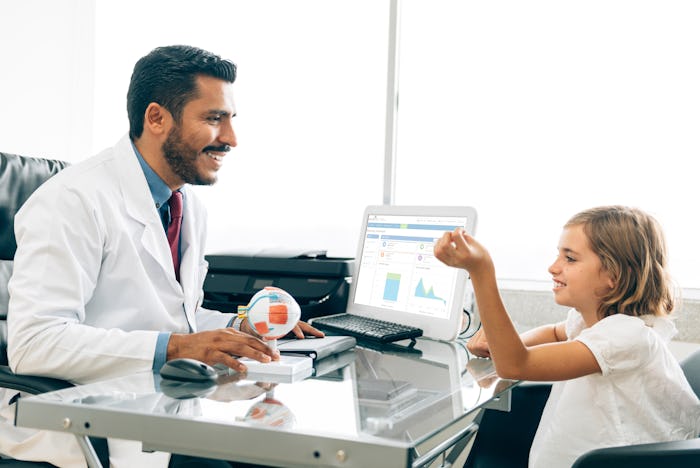Parenting

4 Things Eye Exams Can Tell You About Your Child’s Overall Health
Eye exams aren’t just about vision.
Like most parents, I spend a lot of my energy every single day making sure my kids have the love, safety, education and care that they need and deserve. My deep desire to ensure my children are as healthy and happy as they can possibly be means assembling a qualified team of trusted professionals to monitor their whole health.
That’s why, in addition to regular visits to our primary care physician and dentists, every member of my family undergoes a yearly eye exam as part of our overall whole-body healthcare. Eye exams aren’t just about vision. You can glean a lot of vital health information about yourself and your child from a yearly eye exam.
1. Eye exams can reveal information about non-eye-related health conditions.
Diabetes. Brain tumors. Multiple Sclerosis (MS). Eye exams can reveal symptoms of all three, and that’s just the tip of the iceberg. An eye exam alone can’t always diagnose a serious health condition like diabetes or MS, but an eye doctor might be able to see evidence of a possible problem even before you do and can direct you to your primary care physician for further testing.
“During an eye exam, an eye doctor has a direct view into the back of the eye. This is what allows us to see the retina, blood vessels, and optic nerve, which is an extension of your brain. Additionally, an eye care professional can check for early indicators of diabetes, warning signs for other health-related issues and any other possible retinal findings that could be detrimental to overall health,” says Dr. Jennifer Chinn, a VSP network doctor.
There’s no better time than childhood to start instilling the value of caring for the whole body — and there’s no better way to encourage your kids to make healthy choices than to model those behaviors for them. While you’re scheduling their yearly eye exam, don’t forget to schedule yours, too.
2. Eye exams can detect vision problems that your child might not even recognize on their own.
Your kids might not realize they’re experiencing a vision problem. Kids are amazing at adapting, so your child could be compensating for their vision issue without even knowing it, because some children often don’t understand the concept of blurry vision. With limited or no familiarity with clear vision, some kids assume that how they see is how everyone else sees the world. An eye exam can shed light on potential problems and create an opportunity for corrected vision and a more comfortable day — especially at school.
3. Eye exams provide a vision and eye health baseline.
You might take your kid for an eye exam and find that they have the vision of a bird of prey. Even if no intervention is necessary, an annual eye exam is never a waste of time. Did you know it’s possible for your child to have good vision and unhealthy eyes at the same time? Vision correction is just one part of what an eye doctor can do for your child.
Childhood eye exams provide valuable information that allows their eye doctor to track any changes in your kid’s vision or eye health should they arise in the future. “Poor vision can adversely affect learning, as well as emotional and social health, so keeping your child’s eyes healthy and managing their vision is an integral part of their development,” says Dr. Chinn.
4. Eye exams can detect issues with color vision.
Colorblindness isn’t as uncommon as you might think! Millions of people are unable to accurately distinguish between certain colors. You might have heard rumors that people who are colorblind can’t do things like become pilots or serve in the military, but that’s not strictly true. Colorblindness comes in varying levels of severity and includes a range of presentations. An eye exam and a good relationship with your eye health professional can provide insight on the type of colorblindness your child is experiencing.
“I tell my patients they should start scheduling their child’s eye exam at an early age, ideally around 6 months old. Your child’s eye doctor can check on things like tracking and eye mobility that are crucial for developmental milestones, in addition to assessing their vision. As your child grows, their eye doctor will keep a lookout for other health-related issues,” says Dr. Chinn.
Eye exams truly are a window into a person’s overall health. Including an eye doctor as part of your family’s healthcare team is as necessary as finding the right primary care doctor or dentist. With May being Healthy Vision Month, it’s the perfect time to prioritize finding a VSP network eye doctor near you and scheduling annual eye exams for your whole family.